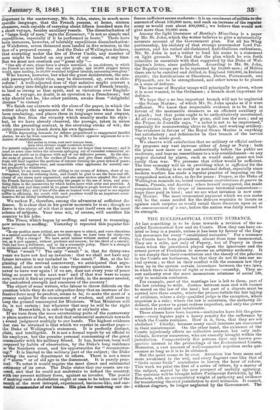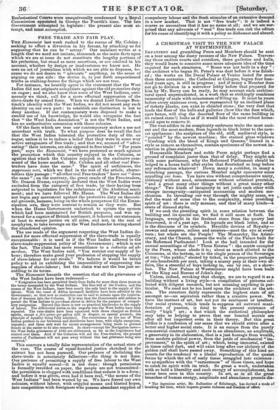THE ECCLESIASTICAL COURTS NUISANCE.
AT last something is to be done towards a revision of the so- called Ecclesiastical Law and its Courts. How they can have ex-
isted so long is a puzzle, unless it has been by favour of the Eng- lish reverence for every "established nuisance." For a nuisance the Courts have been proclaimed, almost from time immemorial. They are a relic, not only of Popery, but of Popery in those times when the priesthood played upon the ignorance and the armed power of Feudalism to assume an arbitrary authority. It is not simply that their constitution and the theory of the practice in the Courts are barbarous, but that they do not fit into our so- cial system ; so that in their conflict with the common law they keep up in the system certain interstices between the two laws, in which there is failure of right or redress—anarchy. They as- sert authority over the most momentous relations of social life, only to maintain confusion.
For example, part of the marriage law is left to them part of the law relating to wills. Justice between man and wife cannot
be rested on the law of the land ; but part of a dispute must be
carried into these courts where the process forbids the fair taking of evidence, where a duly-qualified judge is the exception, where
nepotism is a rule ; where the law is uncertain, the authority ill- defined, the power to grant redress imperfect, and only the power to molest is evident and indubitable.
These abuses have been known—multitudes have felt the griev- ance—every legatee pays a heavy penalty for the sufferance by which the Courts continue. How is it, then, that they are not abolished ? Chiefly, because many small interests are concerned in their maintenance. On the other hand, the existence of the
Courts injuriously affects no collective interest, but only indi- viduals, however numerous, who are casually brought within the jurisdiction. Comparatively few persons have any known pro- spective interest in the proceedings of the Ecclesiastical Courts.
Moreover, a vast amount of well-connected nepotism seeks qui- escence as long as it is to be obtained.
But the quiet seems to be over. Attention has been more and more awakened to the evil, and every flagrant case like that of " Geils versus Geils" contributes to hasten the hour of reform. This week we print the first of a series of letters, by a master of the subject, moved by the new prospect of usefully agitating. The question will be brought before Parliament forthwith, by Mr. Bouverie, with an accumulated weight of authority and evidence for transferring the civil jurisdiction to civil tribunals. It cannot, without disgrace, be longer neglected by the Government. The Ecclesiastical CoUrts were unequivocally condemned by a Royal Commission appointed in George the Fourth's time. The late Government attempted to legislate: the present also must at- tempt, and must accomplish.



























 Previous page
Previous page